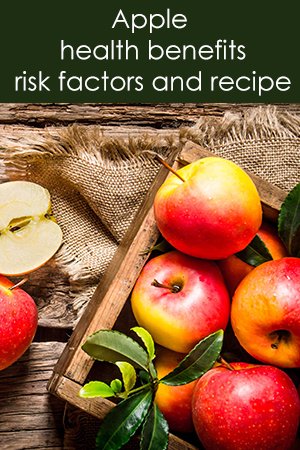Apples, often hailed as a “miracle food” and a “nutritional powerhouse,” are one of the most consumed fruits globally. Their high antioxidant properties offer various health benefits, making them a crucial part of a healthy diet. In this article, we’ll delve into the top 10 science-backed health benefits of apples, explore some potential downsides, and provide tips on storing and enjoying this amazing fruit.
Top 10 Amazing Apple Health Benefits
1. Apple and Cancer Prevention
Research has shown that one-third of all cancers can be prevented through a diet rich in fruits and vegetables. Apples, with their high antioxidant content, play a significant role in reducing cancer risk. Studies indicate that regular apple consumption can lower the risk of lung, colon, and breast cancer. The antioxidants in apples help neutralize free radicals, which can damage cells and lead to cancer development.

2. Apple and Cardiovascular Health
Cardiovascular diseases, such as hypertension, heart attacks, and strokes, are major health concerns today. Apples can help protect your heart by reducing bad cholesterol levels and promoting overall heart health. The polyphenols in apples increase antioxidant enzymes and improve lipid metabolism, reducing oxidative damage and inflammation. Regular apple consumption can significantly lower the risk of cardiovascular diseases.
3. Weight Loss and Management
Maintaining a healthy weight is crucial for overall well-being. Apples are low in calories and high in dietary fiber, making them an excellent choice for weight management. The fiber in apples helps you feel full longer, reducing the urge to overeat. Studies have shown that individuals who consume apples regularly tend to have lower body weight and a reduced risk of obesity-related conditions.
4. Apple and Bone Health
Osteoporosis, a condition characterized by weakened bones, affects millions of people worldwide. Apples are rich in vitamin C, potassium, magnesium, and vitamin K, all of which are essential for bone health. These nutrients help produce alkaline metabolites, which improve bone density and strength. Regular apple consumption can significantly reduce the risk of osteoporosis and fractures, especially in older adults.
5. Apple and Diabetes Management
Type 2 diabetes is a growing health concern globally. Apples contain polyphenols that help regulate blood sugar levels and improve insulin sensitivity. The fiber in apples slows down the absorption of sugar, preventing rapid spikes in blood glucose levels. Studies have shown that regular apple consumption can reduce the risk of developing type 2 diabetes and help manage existing diabetes by stabilizing blood sugar levels.
6. Gastrointestinal Protection
The gastrointestinal tract is exposed to various stressors that can lead to oxidative damage and inflammation. Apples, with their high antioxidant content, help protect the gastrointestinal lining and promote healthy digestion. The fiber in apples also aids in maintaining a healthy gut microbiome, reducing the risk of gastrointestinal disorders such as irritable bowel syndrome (IBS) and inflammatory bowel disease (IBD).
7. Apple for Asthma and Pulmonary Function
Asthma and other pulmonary disorders are on the rise due to environmental factors and lifestyle changes. Apples can help reduce the risk of asthma and improve lung function. The antioxidants and phytochemicals in apples have anti-inflammatory properties that protect the respiratory system. Studies have shown that individuals who consume apples regularly have a lower risk of asthma and better overall lung health.
8. Neurological Disease Prevention
Apples are beneficial for brain health and can help prevent neurological diseases such as Alzheimer’s and Parkinson’s. The phytonutrients in apples protect neurons from oxidative stress and reduce inflammation, which are key factors in neurodegenerative diseases. Animal studies have demonstrated that regular apple consumption can improve brain function and protect against cognitive decline.
9. Improvement of Cognitive Function
Maintaining cognitive function is essential for overall quality of life. Apples contain antioxidants and other compounds that support brain health and improve memory and concentration. Research has shown that individuals who consume apples regularly have better cognitive function and a lower risk of age-related cognitive decline. Including apples in your diet can help keep your mind sharp and focused.
10. Apple and Skin Health
Everyone desires healthy, glowing skin. Apples are rich in vitamin C and antioxidants that protect the skin from UV damage and promote collagen production. The antioxidants in apples help combat free radicals, which can cause premature aging and skin damage. Regular apple consumption can improve skin texture, reduce wrinkles, and promote a healthy complexion.
Potential Risks of Apple Consumption
While apples offer numerous health benefits, it’s important to consume them in moderation. Here are some potential risks to be aware of:
1. Acidic Problems
Individuals with acid reflux or other digestive issues may experience discomfort from eating apples. The natural acids in apples can exacerbate these conditions. It’s best to consume apples in moderation and monitor your body’s response.
2. Tooth Enamel Erosion
Eating too many apples can lead to tooth enamel erosion due to their natural sugars and acids. To minimize this risk, rinse your mouth with water after eating apples and avoid brushing your teeth immediately afterward to prevent enamel damage.
Procedures to Store Apples
To maximize the freshness and nutritional value of apples, store them properly. Keep apples in the refrigerator in a paper bag to maintain their crispness. If you need to store sliced apples, coat them with lemon juice to prevent browning and store them in an airtight container.
How to Eat Apples
There are various ways to enjoy apples:
- Whole Apples: Eating apples whole is the simplest and most common way to enjoy them.
- Apple Slices: Slice apples into wedges for a convenient snack.
- Apple Sauce: Cook apples with a bit of water and sugar to make delicious apple sauce.
- Apple Juice: Blend apples with water and a touch of sugar to make fresh apple juice.
- Baked Apples: Bake apples with cinnamon and a bit of honey for a healthy dessert.
Final Thoughts
Apples are a versatile and nutritious fruit that offers numerous health benefits. From reducing the risk of chronic diseases to promoting weight management and improving cognitive function, apples are truly a powerhouse of nutrition. While there are some potential risks associated with excessive consumption, enjoying apples in moderation can help you lead a healthier and happier life. For optimal health benefits, include apples as a regular part of your balanced diet. Remember, an apple a day can indeed keep the doctor away!
